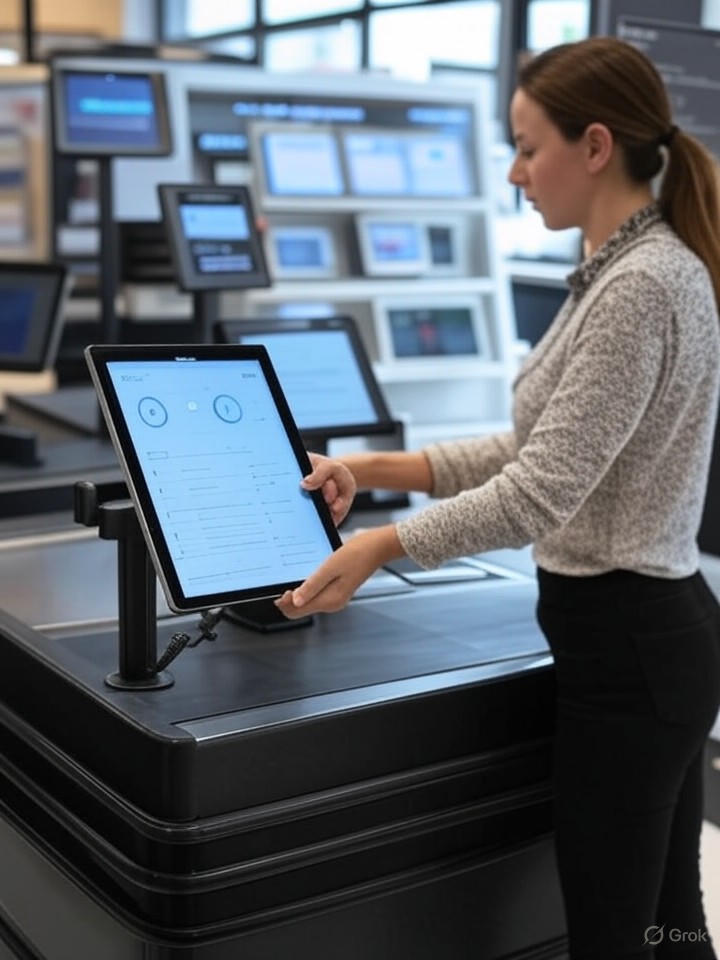AI-Driven Omnichannel Retail Trends: Enhancing Customer Experience
TL;DR
- In 2025, AI integration is surging in omnichannel retail, with 89% of researchers experimenting with it for enhanced insights and data unification. Consumers increasingly blend online and offline channels, expecting personalized experiences. The article details AI's role in personalization, adapting to consumer behavior shifts, market projections, and innovative analytics, ultimately driving seamless, data-driven customer journeys.
AI Integration in Omnichannel Retail
In 2025, AI integration in omnichannel retail is surging, with 89% of researchers experimenting with AI to enhance omnichannel insights. Firms are also planning to leverage AI for data integration, with 83% aiming to unify disparate data sources. This shift is driven by changing consumer behaviors, where 60% of shoppers blend online and offline channels. Omnichannel insights are crucial for accurate journey mapping.

AI-Driven Personalization
AI is transforming retail dynamics through personalization. Consumers expect tailored recommendations across channels, with AI chatbots replacing traditional search engines. Nearly 60% of online shoppers are turning to AI for recommendations. SuperAGI details how AI enhances customer experiences by streamlining operations and personalizing interactions. Accio reveals that AI boosts sales through integrations like TikTok commerce and sustainability initiatives.
Consumer Behavior Shifts and Sustainability Focus
Consumer shopping trends are influenced by AI and a growing emphasis on sustainability. 91% of consumers prefer brands that provide relevant, eco-conscious options. AI in supply chains streamlines operations from inventory to delivery. Harmelin Media highlights the ‘two-tier’ shopper phenomenon, where AI-powered experiences cater to value-driven and premium segments. The integration of AI in supply chains enhances omnichannel efficiency, which is vital as 60% of consumers blend shopping modes.
Market Projections and Economic Impact
AI expenditure in retail is forecasted to reach USD 19 billion by 2027, growing at a CAGR of 34%, fueled by machine learning and consumer analytics. Straits Research projects the AI in retail market to reach USD 41.23 billion by 2033. Morningstar reports that AI ranks among top influences in shopping, expanding purchase journeys and boosting confidence. Shopify lists eight major omnichannel trends for 2025, including AI in fulfillment and retail strategies.
Innovations in Omnichannel Analytics
AI-driven personalization and omnichannel analytics will define retail in 2025, incorporating ESG factors for sustainable growth. The Traceability Hub predicts AI, AR, and circular economy models shaping customer experiences by 2027. Netguru’s blog on consumer behavior trends for 2026 highlights digital-first, socially conscious values amplified by AI personalization and social commerce.
The Role of AI Agents in Future Shopping
Agentic commerce could drive $5 trillion in sales by 2030, where AI handles shopping on behalf of consumers. By 2030, AI agents could influence $30 trillion in spending, transforming buyers into ‘machine customers.’ OSF Digital‘s 2025 Omnichannel Retail Index reveals engagement as the new currency in retail. Shopify’s integration with OpenAI ushers in hyper-personalized shopping and real-time insights, reshaping e-commerce for 2025.
Challenges and Strategic Imperatives
Data privacy concerns and integration complexities must be addressed to fully realize AI benefits. Attest Market Research Trends stresses the essential nature of omnichannel insights for journey mapping, with 89% of researchers experimenting accordingly. Without robust AI strategies, firms risk falling behind.
Optimizing Omnichannel Experiences with AI
Retailers investing in AI-driven personalization practices face a paradox. Despite advanced data systems and recommendation engines, fragmented execution, mistimed engagement, and lack of financial accountability often undermine impact. To optimize omnichannel experiences, retailers must prioritize empathetic timing, cross-functional alignment, and transparent data practices that foster trust and customer-focused outcomes.
Nuanced AI Use
73% of consumers use multiple channels before making a purchase. Retailers often judge the success of AI-powered personalization based solely on online conversion metrics, ignoring how customers actually shop. Leading retailers are addressing this by linking customer interactions across digital and physical channels, connecting recommendation engines to loyalty accounts, mobile app activity, and in-store purchases. Sanjiv Raman, Principal of Technology Modernization Services at Grant Thornton, said, "Customers expect the same brand experience online and in-store, and that requires AI-fueled consistency across systems."
The Personalization Paradox
66% of companies target first-time visitors with personalization, yet only 38% of consumers actually want personalized offers at that stage. Personalization should be adaptive, beginning with subtle improvements to search, navigation, and category relevance. Raman stated that "Quality AI experiences are moving toward something highly tailored but only after there’s enough information to personalize meaningfully," shifting from “personalize everything now” to “personalize when ready.”
Unified Data and Unified Experience
Retailers have spent heavily to build a “single customer view,” but the tech alone doesn’t solve the real challenge: disconnected operations. Legacy workflows, siloed departments, and misaligned goals prevent retailers from turning unified data into unified experiences. Kevin O’Connell, Grant Thornton Principal of Business Consulting, says, “It’s not just automation, it’s about aligning staff, training, and culture with the new customer experience.”
The AI Profit Test
Retailers deploy advanced personalization engines but struggle to prove ROI, especially when attribution is broken or disconnected from revenue reporting. The fix is to treat AI like any other product: with hypotheses, metrics, and accountability. Organizations that build financial discipline around AI efforts unlock a virtuous cycle.
Addressing Privacy Concerns
With consumers opting out of cookies, using VPNs, and blocking tracking apps, many retailers are flying blind. The path forward isn’t to collect more data, it’s to collect it better, by asking customers directly, giving them control, and clearly communicating the benefits. Retailers who embrace privacy will unlock deeper loyalty and more robust personalization, even with less data.
Omnichannel Marketing Trends in 2025
Omnichannel marketing is taking center stage, with 85% of customers now expecting a seamless experience across all retail channels. The global AI market is projected to reach $190 billion by 2025. The landscape is evolving rapidly, driven by the integration of artificial intelligence (AI) and the demand for seamless customer experiences across all retail channels.
The State of Omnichannel Marketing in 2025
73% of consumers use multiple channels to shop, as reported by Harvard Business Review. 60% of retailers are investing in technologies that unify the shopping experience, according to a study by National Retail Federation. Companies with strong omnichannel strategies retain 89% of their customers, compared to 33% for companies with weak strategies, as per a study by Salesforce. Omnisend offers omnichannel marketing automation solutions that help brands personalize their customer interactions.
From Multichannel to True Omnichannel Integration
75% of customers prefer to interact with brands that offer a consistent experience across all channels. Omnisend helps businesses implement omnichannel marketing by providing a unified platform for managing customer data and creating automated workflows. Sephora has implemented a unified commerce platform that integrates online and offline channels. The integration of artificial intelligence (AI) has become a key factor in successful omnichannel strategies.
Hyper-Personalization Through Predictive AI
72% of consumers say they only engage with personalized messages, and 76% of customers get frustrated when they don’t receive personalized experiences. Stitch Fix uses predictive AI to create personalized boxes of clothing, resulting in a 20% higher sales conversion rate. Salesforce uses predictive AI to identify customers who are at risk of churn, resulting in a 25% reduction in churn rate.
Conversational Commerce and AI Assistants
Omnisend reports that companies using conversational commerce have seen a significant increase in sales, with some experiencing up to a 25% boost in conversion rates. According to a study by Capgemini, 55% of consumers prefer using voice assistants for shopping. Sephora and Domino’s Pizza have implemented AI-powered chatbots. By 2025, 80% of customer service organizations will have abandoned traditional phone support and transitioned to conversational commerce, according to a study by Gartner.
Immersive Retail Experiences with AR/VR
The use of AR in retail is expected to increase sales by 15% and reduce returns by 10%, according to a study by Statista. Forrester reports that AI-powered AR and VR experiences have been shown to increase conversion rates by up to 25%. AI-powered AR and VR experiences can reduce returns by up to 20%, according to a study by McKinsey. According to a study by Gartner, AI-powered AR and VR experiences improve customer satisfaction by up to 30%.
Autonomous Omnichannel Orchestration
Companies using omnichannel marketing strategies see a 10% increase in order rates, according to a study by Omnisend. 76% of consumers expect companies to understand their needs and provide personalized experiences, as reported by Salesforce. Companies like Manhattan Associates are already using AI-powered omnichannel marketing platforms to drive business growth. Companies can increase customer retention rates by up to 30%, as reported by Invesp.
Emotion AI and Sentiment-Driven Experiences
Companies using emotional AI can see up to a 25% increase in customer satisfaction, according to Gartner. 85% of customers are more likely to continue doing business with a company that offers a personalized experience, according to a study by Forrester. Salesforce is using emotional AI to power their customer service chatbots. 70% of customers prefer to use chatbots for simple inquiries, according to a study by Oracle.
Measuring Omnichannel Success
85% of customers use multiple channels to complete a transaction. Omnisend’s attribution modeling enables companies to assign credit to each touchpoint in a customer’s journey. 71% of marketers consider attribution modeling crucial to understanding their customers’ behaviors. Manhattan Associates reports that 60% of companies that implement omnichannel strategies see an increase in sales, while 40% experience a reduction in costs.
Retail Digital Transformation with AI
By 2027, 90% of retailers are expected to have scaled AI across key business functions, from logistics and merchandising to marketing and customer service. US retailers that have achieved scale with AI are reporting 2.3x higher sales and 2.5x more profit compared to those that haven’t.
AI Trends Changing the Retail Game
The future of AI in retail is driven by five key trends: AI moving from pilot to platform, hyper-personalization at scale, AI-powered supply chains, the rise of agentic AI, and real-time commerce decisioning. Retailers are scaling AI beyond isolated use cases, embedding it across operations. Machine learning optimizes everything from demand forecasting to last-mile delivery. Autonomous systems are making strategic decisions, reducing friction and increasing agility.
Agentic AI and Strategic Retail Automation
Agentic AI can act autonomously, make decisions based on context, and adapt strategies in real time. It allows retailers to focus on high-level innovation while AI handles the complexity. Agentic AI systems assess goals, evaluate options, and make decisions that align with business outcomes.
Impact of AI-Driven CX
AI-powered CX builds trust, loyalty, and revenue. AI in CX is about aligning marketing, IT, logistics, and service teams around a unified, data-driven view of the customer. AI-driven CX reduces churn, increases lifetime value, and fuels word-of-mouth marketing.
Smart Supply Chains with AI
AI is revolutionizing logistics through predictive analytics, demand forecasting, and real-time inventory optimization. AI tools help anticipate disruptions and proactively reroute supply strategies. AI also improves supplier relationship management by identifying performance patterns. Retailers need a robust data infrastructure and a strategic roadmap that integrates AI across every node of the value chain.
AI Personalization in 2025
65% of shoppers prefer brands that offer AI-powered personalization. Consumers expect dynamic product recommendations based on browsing behavior and tailored advertising that understands intent. AI fuels loyalty programs, retention strategies, and increases revenue per shopper.
Scaling Generative AI in Retail
To unlock the full value, organizations must move from pilot to platform. Three keys to scaling gen AI in retail are a unified data foundation, cross-functional alignment, and change management & upskilling. Retailers that scale generative AI successfully typically start with a strong understanding of their most data-rich customer and content touchpoints.
AI in Retail Examples
Nike uses AI for demand prediction, inventory optimization, and hyper-targeted marketing. Disney leverages AI to personalize guest experiences both online and in parks. Starbucks employs AI in its Deep Brew platform to personalize orders, recommend products, and streamline operations.





